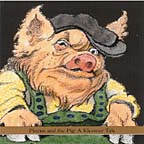"Pincus and the Pig" - Maurice Sendak, z"l captured on disk

As we mourn the passage of the author of In the Night Kitchen and Where the Wild Things Are, I take some delight in remembering that local klez-maven Glenn Dickson got him to participate in a delicious children's project, "Pinkus and the Pig." Here are some blurbs about the project, and I do encourage acquiring a copy of the CD in question.
Hear what Glenn says about Sendak on PRI's "The World
Maurice Sendak's Jewish Soul Revealed in his intimate and unique "Pincus and the Pig" CD!
"Did you hear of Boychick Pincus, how he opened wide the gate and hippety-hopped over the sweet warm meadow?" So begins Maurice Sendak's inimitable recasting of Prokofiev's "Peter and the Wolf." The charming work is unique in Sendak's ouvre in its loving expression of his Jewish upbringing, its use of Yiddish expressions, and its uniquely Jewish humor.
Maurice Sendak was known for his ground-breaking children's books and illustrations, but it was not until late in his life that his Jewishness came to the forefront. In "Brundibar" (2003) he reckoned with the Holocaust, but on "Pincus and the Pig," (Tzadik, 2004) a recording he narrated with the Shirim Klezmer Orchestra, he revealed his personal connections with Yiddish culture. He converted Prokofiev's tale into a Jewish parable, dramatizing it with a Yiddish accent like a veritable "Zeyde" (grandfather).
Sendak said that the piece had great personal meaning for him and brought him out of the depression he felt from working on "Brundibar." Prokofiev's Peter was transformed into Pincus, which was his father's name. The wolf became the terrifying "Chozzer," (Yiddish for "pig"), the term his aunt told him she had used in Poland for anti-Semites. At the close, Pincus ends up triumphant, leading a parade to take "Chozzer" to the non-kosher butcher. For Sendak, who lost the greater part of his extended family to the Holocaust, the victory had deep meaning and resonance.
Sendak's illustrations for the CD also reflect his Jewish sensitivities and humor. The duck has tradtional sidelocks (payot) and the birdie sports a yarmulke. The soldiers of Prokofiev are replaced by bumbling incompetent Cossacks.
"Pincus and the Pig" is the only available recording of Sendak's voice dramatizing his own work, and he utilizes a thick Yiddish accent that recalls the relations he grew up with. Glenn Dickson, clarinetist and co-producer of the album recalls, "Maurice recorded the narration quickly, with just a couple of passes, it was so natural and effortless to him. This demonstrates his own comfort with the material and the accent as well as the clarity of his vision for the story."
Dickson continues, "It was a joy to work with Maurice, he was charming, funny and curmudgeonly. He expressed that the project brought him out of the depression of working on 'Brundibar' and that he loved the story because Pincus, the little Jewish boy came out on top. I think in retrospect, Maurice was the Pincus of his family. He came from a family that was nearly wiped out by the Holocaust, but he emerged a winner, creating his art and executing his career in a very uncompromising way."